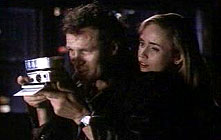|
|
|
|
Slaves
to the Underground
|
 |
|
The conflict that structures most films about rock music is pretty familiar. One band member wants to make personal music while another is keen to sell out and make a packet playing commercial fare. Kristine Peterson's Slaves to the Underground at least proposes a novel variation on this old plot: while riot girl Shelly (Molly Gross) "lives for the music", her girlfriend Suzy (Marisa Ryan) considers their songs a "means to an end" – and the end is left-wing political activism. Despite its lurid title, Slaves to the Underground is naturalistic to the point of being flat, even amateurish. Peterson, who made the fine B thrillers Body Chemistry (1990) and The Hard Truth (1994), here unwisely puts her faith in a gang of non-professional actors who project little personality. Even singer Bob Neuwirth – in the obligatory role of a wise, ex-hippie father-figure to these grungy teens – has trouble with his lines. Producer Bill Cody's script attempts, somewhat gingerly, to introduce and explicate certain aspects of youth culture to those viewers outside such a world. Hence there are monologues (reminiscent of the Australian TV series Raw FM) in which the characters critique slacker attitudes, give tips on how to produce zines, and present the radical philosophy of the women's music movement. All this is lumpily woven into a tortuous tale of queer romance, as Shelly hops between the beds of Suzy and her old boyfriend Jimmy (Jason Bortz) and tries to square the politics of sex and gender. Peterson, surprisingly, seems unable to give this low budget, 16 millimetre project much primitive energy. The staging and camerawork are uncommonly dreary, and too often the story collapses into the hoariest clichés of the modern 'rock drama' genre – such as wheeling in an evil, business-card-wielding yuppie from a "big record company". Slaves to the Underground may have more on its mind than the related music movie Bandwagon (1996), but it is in every respect a less colourful, witty and involving film. It does, however, contain one great speech about films of modern romance: The Graduate is my mother's favourite movie. And the other night it occurred to me that it's actually a movie about a stalker. I mean, here's this guy; he's obsessed with this girl, and even though she tells him to go away and her parents tell him to go away, he keeps after her, follows her around, and then trashes her wedding. The Dustin Hoffman character is actually a selfish, irresponsible proto-slacker, who at the end of the film takes this poor girl hostage. It's your basic romantic slacker-stalker film. And this was the movie that defined a generation – my parents' generation. © Adrian Martin March 1998 |
![]()